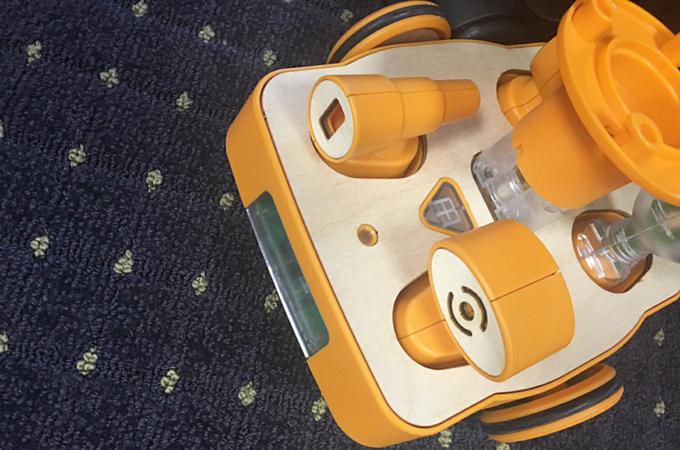Robots coming to a kindergarten near you
BRAINTREE -- Programming robots might not sound like a task for the average kindergartener, but it's something students in 11 Catholic schools across the Archdiocese of Boston will soon be able to do with ease thanks to a new partnership between the archdiocese and KinderLab Robotics.
Founded by Marina Umaschi Bers, a professor at the Eliot-Pearson Department of Child Study and Human Development and the Computer Science Department at Tufts University, and Mitch Rosenberg, a veteran executive of a number of robotics start-ups, KinderLab Robotics was formed out of a need to make Bers' research on new technologies for young children widely available.
That research helped produce KIBO, a robot kit sold by KinderLab Robotics that's designed for 4 to 7 year-olds.
"The KIBO robot comes with wheels and motors, so the child actually gets to have the experience of building and constructing it themselves, and learning what all the different parts mean. There are three sensors -- a distance sensor, a light sensor, and a sound sensor -- as well as a lightbulb," said Amanda Sullivan, a researcher with Tuft's Developmental Technologies Research Group, a group directed by Bers that developed an early model of KIBO.
"How you get KIBO to do things is through programming it, or giving it a series of instructions, and unlike some of the other robotics kits that are out there, KIBO is programmed without any screen time, so no computers or iPads," she continued.
Instead, children are able to scan special wooden KIBO blocks, each one representing a different programming function, to give KIBO commands. By scanning multiple blocks before activating the robot, a string of commands, or a program, is formed, allowing KIBO to carry out a sequence of instructions when activated.
Schools across the world have already started to incorporate KIBO into their early education classes, and, through a new partnership between the archdiocese and KinderLab Robotics, 11 schools in the archdiocese will be utilizing KIBO in their kindergarten classes this year.
"We can be very nimble in Catholic education, and really be innovative in bringing in programs. A lot of schools have been focusing on STREAM... and this was a great way for us to come up with a new way to do that inside our schools," said Amy Ryan, Associate Superintendent for Academics and Digital Learning at the archdiocese's Catholic Schools Office.
An acronym for Science, Technology, Religion, Engineering, Art, and Math, STREAM represents a fairly new initiative that seeks to integrate the six subjects in the classroom in the hopes it will teach students to think more critically and creatively.
Ryan organized a two-day workshop at the Pastoral Center in Braintree Aug. 10 and 11 for kindergarten teachers representing the 11 schools to meet Bers, get hands-on experience with KIBO, and brainstorm how to integrate the robot into their lesson plans.
At the end of the workshop, teachers were able to take with them KIBO robot kits, with schools getting five kits per kindergarten classroom.
Suzanne Kent, a teacher at Blessed Sacrament School in Walpole, said she was pleased at how easy KIBO is to use.
"It's very hands-on and user friendly, which lends itself easily to the classroom, especially early childhood classrooms, where they want to build and create. The robots lead right into that. There's not something like a screen that's too overwhelming for the kids, at this age, to understand," she said.
"It's very open-ended. You can build anything on top of it, you can set different sequences to code it to do different things. So, it's very user friendly and curriculum friendly that it could be adapted into a math unit, estimating how far it can go. You could tie it into science, literacy -- the robots are endless possibilities," she continued.
Andrea Grogan, also from Blessed Sacrament School, said she and Kent had an idea to use the robots in a parade that would celebrate the school's 50th anniversary this year.
She said the students could decorate the robots, and then walk beside them in the parade, which would take place during the school's daily assemblies.
Therese Bethoney from Holy Family School in Rockland and Stephanie Allt from St. Patrick School in Roxbury said that they worked together to come up with their plan for the KIBO robots -- using them in a Christmas Pageant.
"We decided that we would incorporate drama, technology, which would be the KIBO, and the children, we would give them small parts narrating the Christmas story," said Bethoney.
"This would be in December," said Allt, "so at that point they would know how to program it to go straight."
Allt said that she will have "each of her students keep a KIBO notebook," so they will have a "journal to keep track" of the programming strings they create.
Next year, the schools that participated in the two-day workshop will likely be invited back to another workshop to "continue the learning journey," Ryan said.
She said that, because she has received so much interest in this year's workshop, she believes that "next year we would expand it and invite more schools to participate."



















